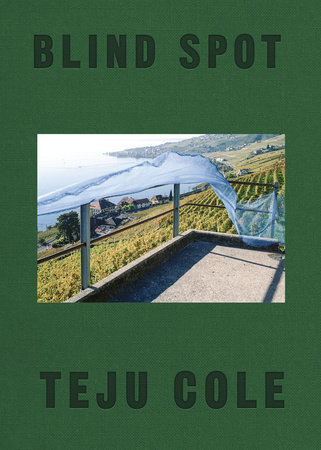“In every act of looking there is an expectation of meaning.”
—John Berger
The first photograph in Teju Cole’s new book, Blind Spot, depicts neighboring suburban driveways in springtime. A chain link fence and a row of bushes with budding leaves mark property lines. A tree shadow crosses the driveway in the foreground. Beyond the hedge, masked by fresh foliage, is a parked RV. Further still is a two-story house with a dark olive green cornice.
This opening image achieves expressiveness even without the text that accompanies it on the opposite page. The contrast between the two driveways; the metal fence, a familiar and unmistakable marker of suburban America; the pointillism of new leaves on the trees—all of these elements invite the eye to linger and roam. But for Cole, the visible is sutured to language. The photograph, paired with an essay called “Tivoli,” must now undergo a transmutation.

“Spring, even in America, is Japanese,” Cole begins. “It is not only the leaves that grow. Shadows grow also. Everything grows, both what receives the light, and what is cast by it. There is more in the world, all of it proliferating like neural patterns. Almost all of it: it is also the most melancholy season…” The subjective springtime moment now brims with signification imparted to it by speech. Immediately, T.S. Eliot’s famous first line, “April is the cruelest month,” flits through the echo chamber of associations.
We are in Tivoli, a tiny town in upstate New York, the first stop on the book’s pilgrimage across the world in 150 photographs and 150 vignette-sized essays, some no longer than a Twitter post.

“Resurrection is far too close to death,” continues Cole, evoking themes to which he will later return. Lines from Chris Marker’s 80s documentary Sans Soleil—a film about a Japanese man who killed himself in Nagoya—elicit meanings from the photograph beyond the reach of the visible. What we read, sentence after sentence, stems from what the photographer saw. Mental images, as well as an off-kilter sense of waking, foreign idiom, cultural and literary allusions, spill onto the driveways. And we are still on the first page.
Blind Spot takes us on an odyssey through five continents, nearly 20 countries and more than 60 locations. Cole jets from upstate New York to Lagos, Nigeria, where he grew up, then takes us to a hotel room in Nuremberg, Germany, whose curtains elicit a meditation on Albrecht Dürer. After that we leap to Auckland, New Zealand, and from there to the Swiss Alps.

Each turn of the page promises a geographic surprise and visual exhilaration. Cole segues with ease from an aerial photograph of Capri’s boats crisscrossing the shimmering sea to McMinnville, Oregon, where planes and helicopters hang in the aviation museum in a similar helter-skelter fashion. In the “Capri” essay, Cole quotes the Irish writer Edna O’Brien who said, “We know about these beautiful waters that have death in them.” In McMinnville, he tells the story of Delford Smith, the late founder of Evergreen International airline, who was raised an orphan and lost his adult son in a car crash.
The book involves us in concurrent journeys: we advance horizontally across the topography of the world as we move vertically through each block of writing. Such navigation requires two acts of seeing. First, we receive the pictures pre-verbally, intuitively. Then, funneled through the engine of prose, we see the same images differently. Each sentence has deposited itself into the photographic rectangle. The world has changed. Sight has become insight. The power of this mutability, as the book progresses, accumulates enough force to become oracular.

In Blind Spot, instants, prized off from time, enter into complicity with memory, history and social thought. Things seen corroborate with things known. The tarp concealing a construction scaffold in Berlin speaks of ISIS soldiers and Guantanamo’s prison jumpsuits, while a nearby construction site on Niederkirchnerstrasse recalls the location of the former headquarters of Gestapo and the SS. In modern-day Bali, the back of a car draped by cloth becomes a silent metonymy, both for the mass murder of over 500,000 Indonesian communists in the mid-60s and for the limits of vision. A ship’s stack in Brienzersee resounds with the final movement of Brahms’ First Symphony. Two cable conduits in Rhinecliff, New York, eulogize the “bipedal grace” of Seamus Heaney’s poetry. Urban contingency speaks on behalf of the dead.

Cole’s vivid, richly colored photographs, captured using a film camera, show objects that are ordinary: a sign on a wall in Brooklyn; everyday items on top of a nightstand in Milan; construction tools on the streets of Bali; fake Gucci bags sold by migrants in Venice; oil drums in a national park in Lebanon; a telephone booth in Mexico City; muddy puddles, ladders, tarps, tufts of grass. Occasionally, we see people from the back.

As a photographer, Cole has an eye for urban non-events, the quiet minutiae and delicate juxtapositions ripe for photographic transfiguration. As a writer—in addition to Blind Spot, Cole has two novels and a collection of essays to his name—what he describes is invisible. The real subject of his frames is not in the viewfinder. It requires a search that continues long after the shutter’s click: a revelation of a moral truth hidden from sight. The book seems to exhaust every possibility for riveting appearance to such revelations of language. The confluence of the two elevates both and transforms an instant into a mometo mori and a celebration of the traveler’s retina, exhilarating the spine with intimations of freedom.
—Lev Feigin
Lev Feigin is a Philadelphia writer, flâneur, and, occasionally, photographer. Born in St. Petersburg, Russia, he holds a Ph.D. in Comparative Literature from the CUNY Graduate Center and is an alumnus of The Writers Institute at the Graduate Center.
Blind Spot was named one of the Best Non-Fiction Books of 2017 by TIME.




